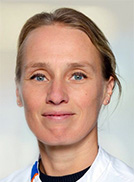Vaccination against COVID-19 is safe and effective in patients with solid tumors
Patients with cancer were excluded from the clinical trials conducted to develop vaccines against COVID-19 leaving unanswered questions to whether the vaccines are safe in this vulnerable population and whether they provide adequate protection against severe forms of COVID-19 to individuals whose immune system may be weakened by various anticancer medicines. Data presented at ESMO put these doubts to bed by demonstrating that individuals with cancer can produce an appropriate, protective immune response to vaccination without experiencing more side effects than the general population.
Patients with cancer have a higher risk for complications and adverse outcomes (i.e. hospitalization, mortality) after a COVID-19 infection. Therefore, international societies all recommend the vaccination of all cancer patients, regardless of the treatment they are receiving. Nevertheless, cancer patients were hardly included in the vaccine registrational trials and patients receiving active systemic therapy were even excluded from these studies. Given the potential interference of chemo-and immunotherapy on the immune system, these treatments may impact the ability to develop an effective immune response to vaccination. Furthermore, these systemic therapies may also increase the risk for adverse events following vaccination. To assess this in more detail, the VOICE study evaluated the impact of immunotherapy, chemotherapy or chemo-immunotherapy on the immunogenicity and safety of COVID-19 vaccination in patients that are being treated for a solid tumor.
The VOICE study
The VOICE trial is a prospective, multicenter, non-inferiority trial that includes four cohorts: individuals without cancer (A) and patients with solid tumors who were treated with either immunotherapy (B), chemotherapy (C) or chemo-immunotherapy (D). Participants received two mRNA-1273 vaccinations 28 days apart. For cohorts B and D, the most recent immunotherapy administration had to be within 3 months before the vaccination. For cohorts C and D, the last course of chemotherapy had to be given within 4 weeks prior to the vaccination. In order to be eligible for the study, patients had to be 18 years or older and have a life expectance of at least 12 months. Patients with a current or previous confirmed SARS-CoV-2 infection were excluded, as were pregnant or breastfeeding women, patients with an active hematological malignancy, patients with an immune deficiency that was not related to their cancer or anticancer treatment and patients who received immunosuppressive medication within 14 days prior to the first vaccination. Patients with a history of malignancy were excluded from cohort A. The primary endpoint consisted of the SARS-CoV-2 Spike S1-specific IgG serum antibody response, defined as >10 binding antibody units (BAU)/ml 28 days after the second vaccination. In addition to this, the study assessed the virus neutralizing capacity of these antibodies, looked at the SARS-CoV-2 Spike-specific interferon-gamma T cell response, and evaluated the incidence of adverse events.
Results
Between February 17th and March 12th 2021, the study enrolled a total of 791 patients. Of them, 22 were seropositive and were excluded and another 26 did not complete the vaccination or the subsequent 28-day measurement leaving a per protocol group of 743 patients (240 in cohort A, 131 in cohort B, 229 in cohort C and 143 in cohort D). In the immunotherapy cohort, skin cancer (48.9%) and urinary tract cancer (24.4%) were the most common cancer types, while this was breast cancer (31%) and digestive tract cancer (28.4%) in the chemotherapy cohort. Almost all (97.2%) patients in the immunochemotherapy cohort had respiratory tract cancer. In all three ‘cancer cohorts’, the majority of patients had stage IV disease (73.3%, 56.3% and 93.7% in cohorts B, C and D, respectively).
At day 28th after the vaccination, 100% of controls and 100% of chemo-immunotherapy treated patients had an antibody response. In the immunotherapy and chemotherapy cohorts this was the case for 99.2% and 97.4% of patients, respectively. As such, the antibody response in cancer patients receiving immune, chemo, or chemo-immunotherapy was shown to be non-inferior to what was observed in healthy controls. To discriminate between suboptimal and adequate responders, the investigators defined a cut-off level at 300 BAU/ml, based on neutralizing capacity. The antibody response was considered adequate after the first vaccination in 66.0%, 37.1%, 32.5%, and 33.3% of the participants in cohorts A, B, C, and D, respectively, raising to 99.6%, 93.1%, 83.8%, and 88.8% by day 28 after the second vaccination. While these rates of adequate responses in treated cancer patients are reassuring, they still leave a proportion of patients unprotected after two vaccinations (6.9%, 16.2% and 11.2% of patients in cohorts A, B and C, respectively). Spike-specific T cell responses were detected in 70.5% of adequate responders and in 46.7% of suboptimal or non-responders. No new safety signals were observed.
Conclusions
Vaccination with mRNA-1273 is safe in patients receiving immunotherapy, chemotherapy, or chemo-immunotherapy for a solid tumor. In this study, the seroconversion rate in treated cancer patients was very high after 2 vaccinations, irrespective of the treatment type, and proved to be non-inferior to that of controls. After one vaccination, only a third of patients had an adequate response, and a significant minority of patients (7-16%) did not develop an adequate antibody response after two vaccinations. However, almost half of the non- or suboptimal responders developed a spike specific T cell response after vaccination.
Reference
Oosting S, Van der Veldt AA, Geurts van Kessel CH, et al. Vaccination against SARS-CoV-2 in patients receiving chemotherapy, immunotherapy, or chemo-immunotherapy for solid tumors. Presented at ESMO 2021; Abstract LBA8.

